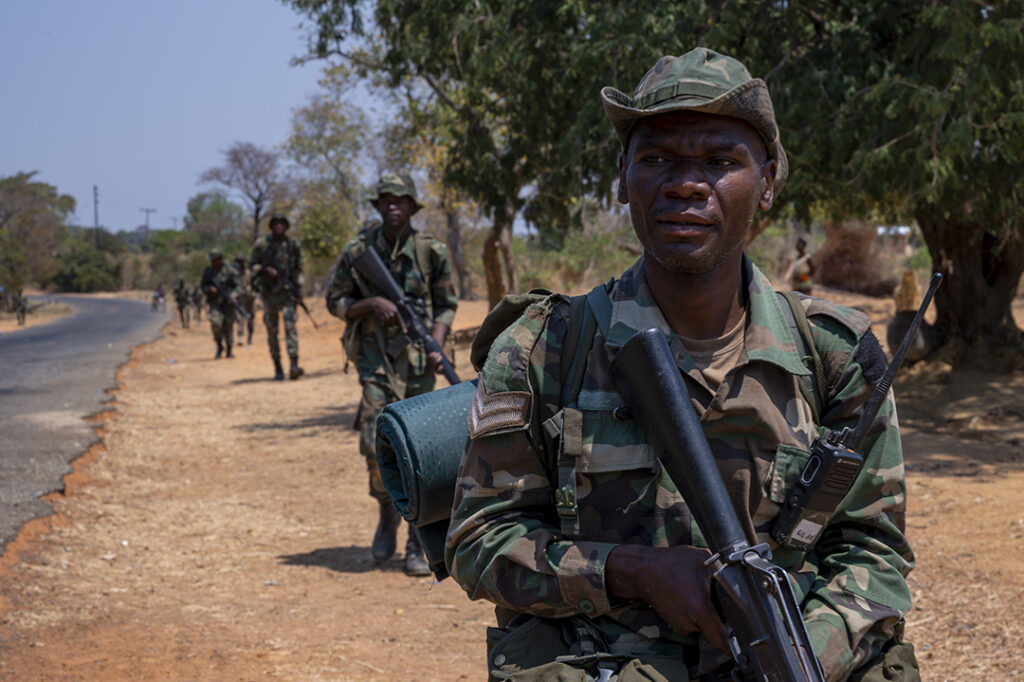ADF STAFF
On a continent where extremist violence has increased 60% since 2021, little outside attention has been paid to the historically peaceful country of Malawi.
But the dangers posed by terrorist groups seeking to expand into Malawi are real, according to independent Africa security analyst Scott Morgan.
“The proper assessment should be that the threat to Malawi is an external threat rather than an internal threat,” he wrote in a September 19 brief on the website Militant Wire. “The porosity of borders, the geography, and a limitation of capabilities coupled with scant foreign support makes Malawi a highly vulnerable country to outside militant movements.”
To its east and west, the country is positioned about 200 kilometers from two extremely active and deadly terrorism hotspots — the Cabo Delgado province in northern Mozambique, and eastern Democratic Republic of the Congo.
Both regions are home to terrorist groups that have affiliated themselves with the Islamic State group (IS).
In September, an official from the National Intelligence Service (NIS) presented evidence of terrorist activities within Malawi to the Public Affairs Committee of Parliament at a forum in Mangochi. Speaking on condition of anonymity, the official said the NIS is aware of several incidents have taken place recently, including attempts by the Islamic State group to recruit fighters from Malawi and the surrounding region. The official presented communications and videos purportedly shared among recruiters, including one that discussed using forests in Malawi for training.
A United Nations Group of Experts on the DRC highlighted organizational links between the insurgents in Cabo Delgado and an IS-aligned group called the Allied Democratic Forces based in the eastern DRC. In a 2023 report, the experts said that the groups have held several meetings “since late 2021 … to discuss operational strategy and tactics.”
Noting the growing importance of IS-Somalia to the terror group’s global leadership, Morgan said all of its African affiliates are plotting to grow.
“It is clear that the Islamic State’s sizable Africa branches are seeking to expand their influence across the continent,” he wrote. “We are inclined to place Malawi on the list of places where the Islamic State wants to expand their influence.”
At the Malawi briefing in September, the NIS official pointed to the conviction of a Ugandan man, Mwenyi Abdullah, in January 2023 as an example of a terrorist threat. Abdullah was sentenced to nine years in prison to be followed by deportation for illegally entering the country and possessing two firearms and ammunition. He was found in the eastern city of Mangochi with two IS flags.
“We discovered that he was linked to [IS] and was on a mission to recruit young people before he was apprehended. He was found to be an active affiliate of [IS],” the official said, according to Malawian newspaper The Daily Times.
Authorities in Malawi are particularly concerned with a recent influx of foreign nationals into forests in Mangochi, such as Namizimu.
“They seek resources to fund their activities and are always in search of money to buy ammunition,” the NIS official said. “In our case, we know there is conflict in Cabo Delgado in Mozambique, which is close to our border in the eastern region, and the threat of terrorists infiltrating into Malawi remains.”
Public Affairs Committee Chairperson Patrick Thawale warned that Malawians must not be complacent about the risks of terrorism to the members of the Southern African Development Community (SADC).
“No country is immune to the threat of terrorism,” he said during the meeting. “It poses fundamental challenges to Malawi, the SADC region and the international community. It undermines core values such as the constitution, the rule of law, respect for human rights, civilian protection, tolerance and peaceful conflict resolution.”

